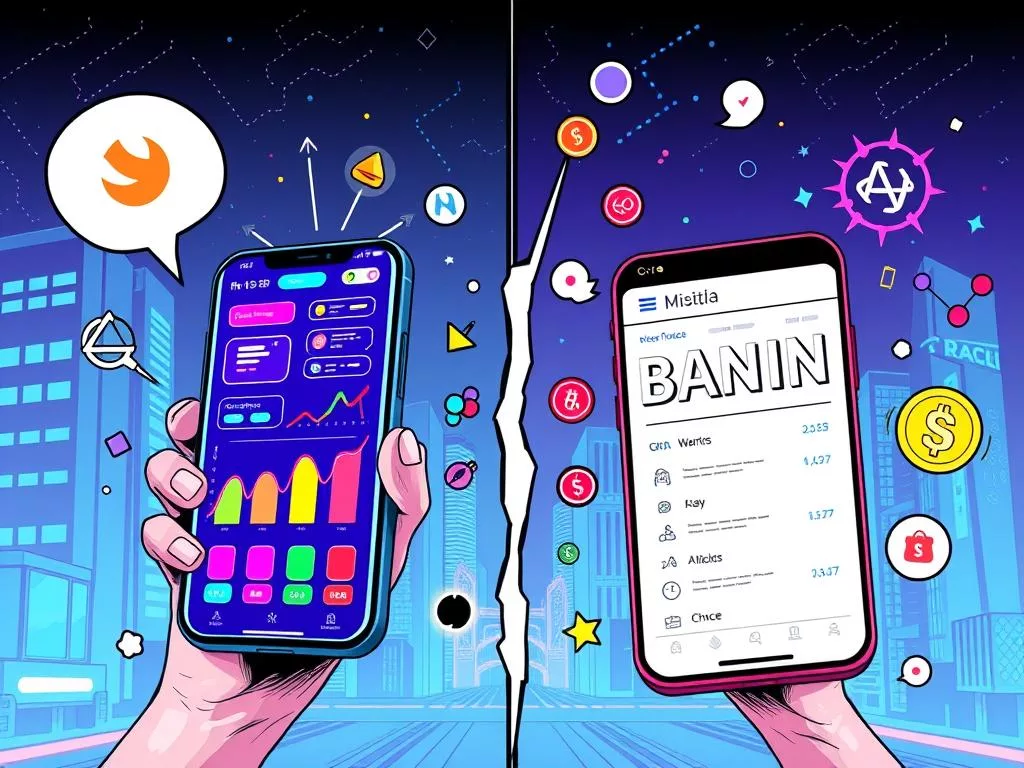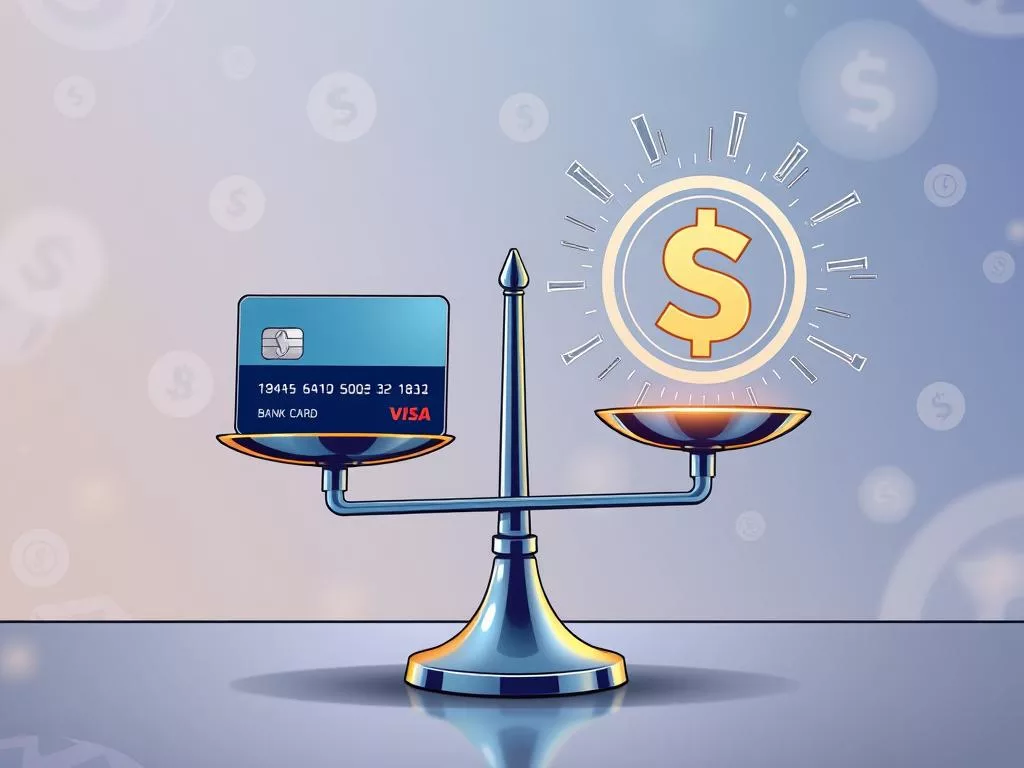In the digital banking world, Starling Bank and Revolut stand out. They cater to those who like managing money on mobile apps. This comparison will show you what makes each bank special.
Starling Bank has no monthly fees and lets you deposit cash for free. You can also withdraw money for free at ATMs anywhere. It offers a 3.25% interest rate on balances up to £5,000. This makes it great for saving money.
Starling also has cool tools for budgeting and tracking your spending in real-time.
Revolut, on the other hand, has flexible plans and no fees for spending abroad up to £1,000 a month. You can pick a plan from £3.99 to £45.00 a month. It’s good for those who travel a lot.
But, Revolut charges a 2% fee for ATM withdrawals over £200 abroad. It’s a solid choice for international spending.
When looking at online banking, think about what you need. Both Starling and Revolut offer great online banking experiences.
Deciding between Starling Bank and Revolut depends on your banking needs. Think about what’s important to you, like free withdrawals or investing in cryptocurrencies. This will help you choose the right bank for you.
Overview of Starling Bank and Revolut
This section gives a mobile banks overview of Starling Bank and Revolut. They are two top challenger banks with modern digital banking services.
Starling Bank started in 2014 by Anne Boden. It offers banking for both personal and business use. Features include free ATM withdrawals and in-app cheque deposits. It’s a fully licensed UK bank, giving customers strong protection.
Revolut was founded in 2015 by Nikolay Storonsky and Vlad Yatsenko. It began with currency exchange but now offers many services, like cryptocurrency trading. It’s not fully licensed in all countries but is known for easy international transactions.
Both challenger banks have cool banking apps features. Starling focuses on simple, clear banking. Revolut offers a wide range of services for global financial needs.
| Starling Bank | Revolut | |
|---|---|---|
| Year Founded | 2014 | 2015 |
| Total Users | Not listed | Over 40 million |
| Founder(s) | Anne Boden | Nikolay Storonsky, Vlad Yatsenko |
| Key Services | Personal and Business Accounts, Free ATM Withdrawals, In-App Cheque Deposits | Personal and Business Accounts, Cryptocurrency Trading, Expense Analysis |
| Banking License Status | Fully Licensed UK Bank | In Process of Acquiring a Full Banking License |
| Protection | FSCS Protection | No FSCS Protection |
| International Transactions | Available to 38 Countries in Europe | Supported in More than 150 Countries |
| Additional Features | Low-Cost and SWIFT Transfers | Multi-Currency Accounts, eSim Data Plans |
When looking at Starling vs Revolut, both are great at digital banking. They meet the changing needs of users. The variety of banking apps features is key when choosing between these two challenger banks.
Guide to Starling Bank vs Revolut
In today’s world of tech-savvy banking, picking the right service can really make a difference. This guide compares Starling Bank and Revolut, focusing on their key features and services. It’s important to look at the different types of accounts they offer, like personal, business, and children’s accounts. Also, services like international money transfers and ATM withdrawal policies are key.

- Cash Deposits: Starling charges 0.7% on balances over £1,000, while Revolut doesn’t charge for deposits.
- Check Deposits: Starling lets users deposit cheques up to £1,000 in-app, unlike many banks that require postal handling.
- ATM Withdrawals: Starling offers fee-free global ATM withdrawals. Revolut also provides fee-free withdrawals internationally within certain limits.
Security is also a big factor. Starling Bank is a registered UK bank, giving users FSCS protection. Revolut uses its own safeguarding scheme, a key difference highlighted in our financial app guide. Both banks have specific rules for international transfers. Starling charges 0.4% for transfers and £5.50 for SWIFT payments. Revolut uses Wise for its low-cost fees on international transfers.
| Feature | Starling Bank | Revolut |
|---|---|---|
| International Transfers | 0.4% fee + £5.50 per SWIFT payment | Variable low-cost fees via Wise |
| ATM Withdrawals | Fee-free globally | Fee-free up to specific limits |
| Account Types | Personal, Business, Kid’s Account | Personal, Business, Savings Vaults |
| Security | FSCS protection | Safeguarding scheme |
When choosing the best banking app, accessibility and user experience are key. Starling Bank offers features like direct debits, overdrafts, and money management tools. Revolut is known for its flexible multi-currency accounts and clear international financial services. This guide shows that the best choice between Starling Bank and Revolut depends on personal preferences and financial needs.
Fees and Charges
When looking at banking fees, it’s key to compare them to find the best deal. Starling Bank and Revolut offer unique banking experiences with different fees. Starling Bank has no monthly fees and free ATM withdrawals, perfect for daily banking.

Revolut, on the other hand, has a tiered system with plans from free to £45 a month. Each plan comes with different perks, like more withdrawals and lower fees for international transactions. Let’s dive into the fees and benefits of each:
| Feature | Starling Bank | Revolut (Standard, Plus, Premium, Metal, Ultra) |
|---|---|---|
| Monthly Fee | None | £0 / £3.99 / £6.99 / £12.99 / £45 |
| ATM Withdrawal Fee | None | 2% Fees after free limits |
| Currency Exchange Fee | 0.4% transfer fee | 1% weekend markup, fees for exceeding limits |
| International Transfer Fee | 0.4%, delivery fees from 30p | Varies, Discounts for Premium/Metal/Ultra |
| Card Replacement Fee | £60 overseas | Varies by plan |
| Negative Interest on Euro Balances | -0.5% on balances >€50,000 | Not specified |
| Business Account Fee (Euro/Dollar) | £2/£5 monthly | Not available |
Revolut’s fees are more complex due to their tiered system. But, they offer benefits like holding multiple currencies and discounted international transfers for premium plans. For instance, Starling Bank vs Revolut highlights these differences.
Starling Bank, on the other hand, is known for its simple, no-fee accounts. They charge a 0.3% fee for cash deposits, making it easy to compare costs. This helps users find the best banking option for their needs.
If you’re looking for online banking outside the UK, check out the best options. For example, Top Online Banks in Ireland.
Spending Abroad
Frequent travelers need a banking solution that saves money on foreign transaction fees. Starling Bank and Revolut offer great travel banking options. But, they differ in how well they work and how much they cost.
Starling Bank is great for travelers. It uses the Mastercard exchange rate and has no fees on foreign ATM withdrawals, up to £300 a day. This makes it easy to get cash abroad without extra costs.
Revolut, on the other hand, uses the Interbank exchange rate, which is often better. But, it has limits. Standard members can spend £1,000 abroad for free each month. After that, there’s a 1% fee. Also, Revolut charges a small surcharge on weekends due to market closures. Yet, it offers benefits like no fees at 55,000 ATMs worldwide and sending money to over 160 countries.
Choosing the right travel banking solution can save you money. Paying in the local currency can avoid extra conversion fees. This is explained in a comprehensive guide. Using cards with no foreign transaction fees can also save you money. So, looking at what Starling and Revolut offer can help you save and travel without stress.

